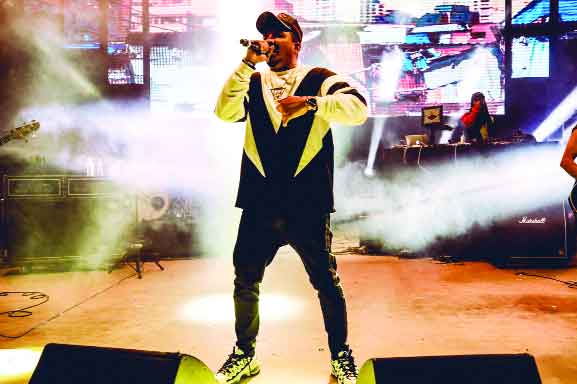How and why did you choose to rap?
I was born in Kurla, and grew up in Sahar with my family before my mother left for a job in the Middle East. I then moved in with my grandmother who lived in JB Nagar. My introduction to hip-hop was through a t-shirt. This friend of mine was wearing this shirt with 50 Cent on it. I was curious so I asked him who was that, and he gave me this CD which had maybe 70-80 songs on it. I heard all the songs. 50 Cents was the rage and it was the coolest thing I had heard. I started digging deeper, I would sit in cyber cafes to learn as much as I could about hip-hop. I realised that 50 Cent wasn’t even among the coolest! Tupac, Biggie, Nas, Eminem. I learnt their songs. They wrote about the world around them. It wasn’t pretty, much like my life.
I learnt more about hip-hop and writing rap when I met Abhishek Dhusia (Ace) and Amey Patkar (AP), founders of the city’s first rap crew — Mumbai’s Finest. I was about 17-18. In those days, people were active on Orkut. We had online communities like Insignia Rap Combat, who would participate in online text rap battles.
My first solo song was released in 2013 — Voice of the streets. It had lyrics like “born in the gutter, raised by a single mother”. I would write my own rap but it never felt convincing till I switched to Hindi. It was only when I started writing in Hindi that I was able to translate my thoughts into words effortlessly. In 2014, I released Yeh mera Bombay which had lyrics in Hindi and English and that racked up like one lakh views in a few months, and won me an award. That’s when I knew hip-hop was where I belonged.
How difficult is it to be a rapper?
People either didn’t know or understand hip-hop, or would assume that it’s about booze or girls or violence. I didn’t sing about any of that. I wrote songs about my neighbourhood, my friends and my life. People in the rap scene understand what goes into writing a verse, what flow is. Most importantly, if you’re authentic, people will respect you.
Would you agree that rap culture in India has come of age or do we still have a long way to go before we can catch up with the West?
Hip-hop is a form of storytelling that exists all over the world. There are certain elements that make it. But the beautiful thing about it is that you can adapt it to whatever language you want. I rap in Hindi because it helps me reach a wider section of people, it makes my story and the listening experience more authentic. The Indian hip-hop scene is documenting the 21st century in a way that books did.
Why is it that rappers choose words that are a bit crude or should we say swear words?
Well, a lot of rappers write songs about what they see, what they hear. Yes, a lot of hip-hop is also about violence and women and booze. But hip-hop came from the streets and life on the streets isn’t polite and clean.
Would you agree that rap that has found its way into Bollywood is different from hardcore rap of today? What is the difference?
Punjabi rap has been around in Bollywood for a long time, and that was the style they adopted every time a movie needed a party time. But Gully Boy is the story of hip-hop in Mumbai, and how the city was essential to its growth.
Do you think Gully Boy will help promote rap in India?
It might help people understand what hip-hop is. it will introduce new names and new sounds to people. That is a definite plus. But beyond that, I’m curious myself to see how this pans out. I know that Zoya (Akhtar) has spoken about how she hopes Gully Boy will shine a light on the indie music industry. Maybe it will help new and exciting talent shine through.
Writer & Courtesy: The Pioneer








 OpinionExpress.In
OpinionExpress.In















Comments (0)